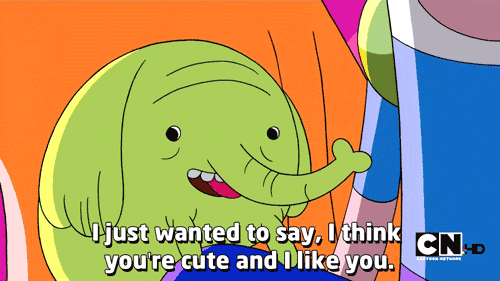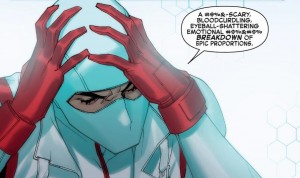In my grand tradition of waiting much too long to read good comics, I didn’t read the new X-Force by Si Spurrier and Rock-He Kim until late last month.
It’s ridiculously enjoyable, with a cast that features a non-fetishized Psylocke, strong representation of LGBTQ people, and deeply flawed characters. The members of X-Force are hot-tempered, unstable, abrasive, insecure, and haunted by their own mortality, but they still manage to pull together and do what needs to be done. It sends the encouraging message that being great doesn’t mean being flawless— you just have to figure out how to work with your flaws and be the best that you can.
What made the series really stand out for me, though, was Fantomex’s mental breakdown.
Fantomex was introduced by Grant Morrison in New X-Men as a sort of rakish, reckless French mutant adventurer with a thick accent and joyfully arrogant approach to life.
In issue #4 of X-Force, he has a breakdown occasioned by the realization that his teammates excel in areas that he doesn’t, and that he’s dependent upon their help to cover his failures. He can’t cope with his fallibility or the idea of anyone outclassing him, hence the breakdown.
We also learn that his dashing French accent is faked. In other words, he’s trying to be the person he thinks he should be, and/or whatever would make him most appealing to others.
At the end of the issue he concludes that, since his whole persona depends on him being the best at everything, he has to murder everyone who’s better at anything than he is—even if they’re his teammates (i.e. the closest he has to friends).
Reading that felt like Spurrier could have been writing about me, to the point where I had to take a break from X-Force for a few days before diving into the next issue.
It wasn’t literally me, of course; I’m not the homicidal type, and I’ve never had a detailed conversation with someone in my head while performing daring action feats.
But take the hyper-jealous competitiveness of my childhood and most of my adulthood thus far, blow it up to comics-narrative proportions, and you get Fantomex.
In his breakdown I recognized the terrible fear that if you can’t be better than everyone else around you, then you’re not worth anything at all. And if you aren’t worth anything, what do you do?
As a young child, I was a very high achiever. I won huge trophies in Kumon and prizes for Soroban (Japanese abacus) math competitions, took occasional classes with the older kids at school, and of course had private tutoring once a week.
And I loved to write. I wrote poems and stories all over the place. It was something I was good at that actually made me happy. Something special just for me.
Happiness was difficult to come by at that time—I didn’t have a name then for how I felt, but now I’d say I was depressed—so I needed something on which to build a sense of self-worth. The superiority I felt as a result of high achievement thus became the foundation of the closest thing I had to a positive self-image.
As I grew older, though, I met more and more people who won prizes that I couldn’t, got better grades than me, and, most painfully, were brilliant writers. These came together in one of my closest friends: an all-around higher achiever than me and a hell of a writer. But at least we were on relatively even ground, since we were in the same writing scholarship program in college. Our interests were also divergent enough that I didn’t feel like we were competing per se (she’s a medievalist; I write about Batman and mutants punching mutants). 
Then I met my husband.
We were on the same Creative Writing MA, but he had his first collection of poetry coming out later that year, and we were the same age. Plus he’d gone to Oxford—not only as an undergraduate but as a Masters scholar in Mathematics—and had a full scholarship for our MA. As our relationship progressed, he got nominated for major awards, praised in national newspapers, and my writing career didn’t move forward at all.
Actually, that’s not true. I did get some poems published in literary journals, but because I couldn’t catch up to him in terms of prestige, I still felt stalled. I also didn’t try to write as much as I should have, but if there was no way I could measure up, then what was the point of trying?
Of course I was jealous. But a) I didn’t know how to deal with those feelings and b) I couldn’t run away from the problem, because that would have involved breaking up and there was no way I was going to do that. So I let the jealousy fester until it turned into a concealed bitterness.
I tried option c) for a while: branching out into professional fields I’d never considered, like performance storytelling. However, it turns out that the more you stretch yourself, the more people you’ll find who are better than you at what you’re trying to do.
Remember that depression I mentioned earlier? It never really went away, and now with no “First Place” after my name, no book with rave reviews, no imminent prestige to speak of—compounded with the guilt of having resented the love of my life for years—there was nothing to hold it back. It felt like the entire structural framework of my head was crumbling.
With counseling and antidepressants, I worked through those feelings to the point where I can now speak of them in the past tense. But I haven’t quite flushed them out of my system, and I certainly haven’t forgotten them.
Having stirred up all that emotion, it’s a relief that X-Force also offers a healthy way out.
 In the most recent issue, Hope Summers, disguised as MeMe, counsels a dejected soldier/mutant: “You realize what really counts isn’t being with or like or defined by anyone or anything else…but just being the best at being you.”
In the most recent issue, Hope Summers, disguised as MeMe, counsels a dejected soldier/mutant: “You realize what really counts isn’t being with or like or defined by anyone or anything else…but just being the best at being you.”
It always helps to have that reinforced, because it was a lesson that took me my whole life to learn.
 If anyone recognizes themselves in what I’ve written, take a lesson from X-Force. Instead of hurting yourself by worrying about whether people are better at something than you (because spoiler: someone will always be better at something than you), just be who you are.
If anyone recognizes themselves in what I’ve written, take a lesson from X-Force. Instead of hurting yourself by worrying about whether people are better at something than you (because spoiler: someone will always be better at something than you), just be who you are.
You’re the only you in the entire world. In all of human history, there has never been anyone exactly like you, and there never will be. No one could possibly be a better you than you.
And like me, like everyone else, like the members of X-Force, you’re imperfect, but you—not the idealized, unattainable you; the you that is reading this right now—are capable of making a positive difference in the world. Just be you.




Excellent piece, Kelly. I really appreciate how you shared your personal experience in relation to the comic book. I want more like this!!!! 🙂